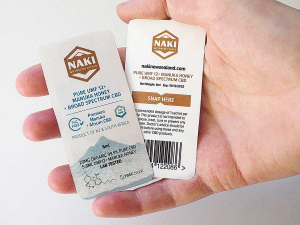Naki unveils the world’s most expensive manuka honey
Naki Honey, a New Zealand manuka apiary company, has crafted what is believed to be the world's most expensive honey.
 The manuka honey and cannabidiol (CBD) blended nutraceutical is aimed at the billion-dollar export market.
The manuka honey and cannabidiol (CBD) blended nutraceutical is aimed at the billion-dollar export market.
In what is described as a first for the country, Taranaki-based Naki New Zealand has developed a mānuka honey and cannabidiol (CBD) blended nutraceutical aimed at the billion-dollar export market for CBD edibles.
Cannabidiol is a substance found in cannabis that has potential therapeutic value with little-to-no psychoactive properties. Proponents claim CBDs can assist with alleviating a wide range of conditions – including anxiety, pain, insomnia and inflammation.
The global market for CBD-infused edibles is set to grow by 25% annually over the next seven years and is estimated to be worth over $8b in Europe alone.
Naki New Zealand will launch a new single-serve mānuka honey product blended with a CBD extract. The company claims to have existing interest for the product in six of their key US and European markets.
Naki NZ global market manager Derek Burchell-Burger says there are distinct differences in New Zealand’s mānuka honey export markets.
“For the Chinese, mānuka honey is among the most expensive and carries a premium, mainly for the associated social status,” he says. “The European market is noticeably different, with the product is more likely to be sold through a naturopathic practitioner channel.”
Burchell-Burger claims European consumers are more educated about the medicinal qualities of mānuka honey and recognises how its sugars enter directly into the bloodstream.
“Leading to questions about antibacterial methylglyoxal levels, anti-viral, immuno-potentiating abilities and, of course, the UMF grade.”
Meanwhile, he says the Asian market model centres around established distribution networks, which push the mānuka message – with local celebrities and influencers helping to endorse the product.
“By contrast, in Europe and the US, the selling pathway is more hands-on at a retail level, with one-on-one conversations with pharmacies, supermarkets and wellness outlets.”
The new Naki Honey Mānuka CBD blend will be available as a single-serve, snap pack product (familiar for the delivery of sauces and ketchups) and at $5.50 - $6.00 – a similar cost to a takeaway coffee.
Burchell-Burger says the company has faced several challenges that have hampered development of the new product.
“The current regulatory environment in New Zealand is not conducive to the development of CBD edibles, so honey has to be shipped to South Africa where it is blended with a broad-spectrum CBD extract,” he explains. “This is the first time that Naki New Zealand has not produced a honey product locally, but it was necessary in order to expedite entry to a rapidly evolving market.”
Burchell-Burger believes the restrictions have reduced New Zealand’s potential export earnings.
“Regardless of the outcome of the referendum (legalising marijuana) there is a huge export opportunity for the development of other CBD edibles,” he claims.
“The tight regulatory environment around CBD development in NZ also means we are coming to the party quite late.”
Legal controls on the movement of fruits and vegetables are now in place in Auckland’s Mt Roskill suburb, says Biosecurity New Zealand Commissioner North Mike Inglis.
Arable growers worried that some weeds in their crops may have developed herbicide resistance can now get the suspected plants tested for free.
Fruit growers and exporters are worried following the discovery of a male Queensland fruit fly in Auckland this week.
Dairy prices have jumped in the overnight Global Dairy Trade (GDT) auction, breaking a five-month negative streak.
Alliance Group chief executive Willie Wiese is leaving the company after three years in the role.
A booklet produced in 2025 by the Rotoiti 15 trust, Department of Conservation and Scion – now part of the Bioeconomy Science Institute – aims to help people identify insect pests and diseases.